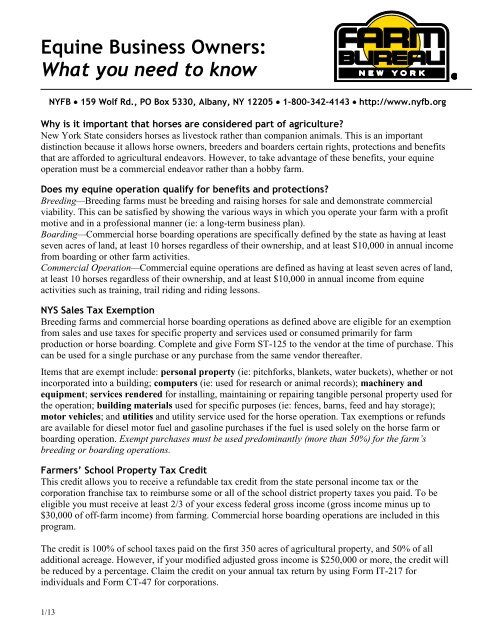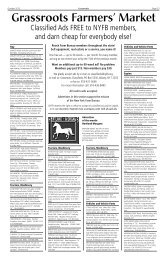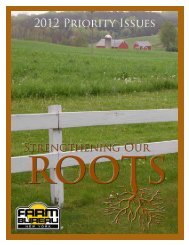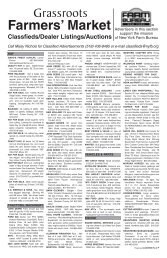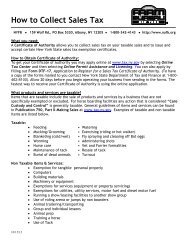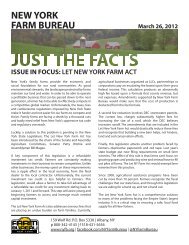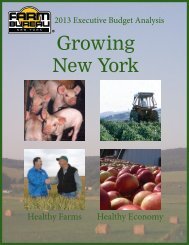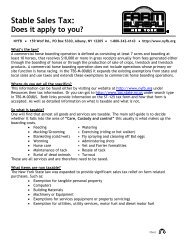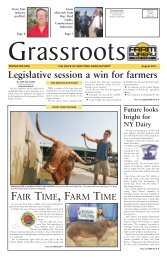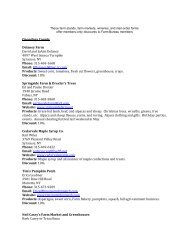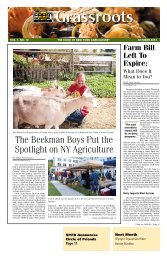Fact Sheet: Equine--What you need to know - New York Farm Bureau
Fact Sheet: Equine--What you need to know - New York Farm Bureau
Fact Sheet: Equine--What you need to know - New York Farm Bureau
- No tags were found...
You also want an ePaper? Increase the reach of your titles
YUMPU automatically turns print PDFs into web optimized ePapers that Google loves.
<strong>Equine</strong> Business Owners:<strong>What</strong> <strong>you</strong> <strong>need</strong> <strong>to</strong> <strong>know</strong>NYFB 159 Wolf Rd., PO Box 5330, Albany, NY 12205 1-800-342-4143 http://www.nyfb.orgWhy is it important that horses are considered part of agriculture?<strong>New</strong> <strong>York</strong> State considers horses as lives<strong>to</strong>ck rather than companion animals. This is an importantdistinction because it allows horse owners, breeders and boarders certain rights, protections and benefitsthat are afforded <strong>to</strong> agricultural endeavors. However, <strong>to</strong> take advantage of these benefits, <strong>you</strong>r equineoperation must be a commercial endeavor rather than a hobby farm.Does my equine operation qualify for benefits and protections?Breeding—Breeding farms must be breeding and raising horses for sale and demonstrate commercialviability. This can be satisfied by showing the various ways in which <strong>you</strong> operate <strong>you</strong>r farm with a profitmotive and in a professional manner (ie: a long-term business plan).Boarding—Commercial horse boarding operations are specifically defined by the state as having at leastseven acres of land, at least 10 horses regardless of their ownership, and at least $10,000 in annual incomefrom boarding or other farm activities.Commercial Operation—Commercial equine operations are defined as having at least seven acres of land,at least 10 horses regardless of their ownership, and at least $10,000 in annual income from equineactivities such as training, trail riding and riding lessons.NYS Sales Tax ExemptionBreeding farms and commercial horse boarding operations as defined above are eligible for an exemptionfrom sales and use taxes for specific property and services used or consumed primarily for farmproduction or horse boarding. Complete and give Form ST-125 <strong>to</strong> the vendor at the time of purchase. Thiscan be used for a single purchase or any purchase from the same vendor thereafter.Items that are exempt include: personal property (ie: pitchforks, blankets, water buckets), whether or notincorporated in<strong>to</strong> a building; computers (ie: used for research or animal records); machinery andequipment; services rendered for installing, maintaining or repairing tangible personal property used forthe operation; building materials used for specific purposes (ie: fences, barns, feed and hay s<strong>to</strong>rage);mo<strong>to</strong>r vehicles; and utilities and utility service used for the horse operation. Tax exemptions or refundsare available for diesel mo<strong>to</strong>r fuel and gasoline purchases if the fuel is used solely on the horse farm orboarding operation. Exempt purchases must be used predominantly (more than 50%) for the farm’sbreeding or boarding operations.<strong>Farm</strong>ers’ School Property Tax CreditThis credit allows <strong>you</strong> <strong>to</strong> receive a refundable tax credit from the state personal income tax or thecorporation franchise tax <strong>to</strong> reimburse some or all of the school district property taxes <strong>you</strong> paid. To beeligible <strong>you</strong> must receive at least 2/3 of <strong>you</strong>r excess federal gross income (gross income minus up <strong>to</strong>$30,000 of off-farm income) from farming. Commercial horse boarding operations are included in thisprogram.The credit is 100% of school taxes paid on the first 350 acres of agricultural property, and 50% of alladditional acreage. However, if <strong>you</strong>r modified adjusted gross income is $250,000 or more, the credit willbe reduced by a percentage. Claim the credit on <strong>you</strong>r annual tax return by using Form IT-217 forindividuals and Form CT-47 for corporations.1/13
10-Year-Real Property Tax Exemption<strong>New</strong> or substantially reconstructed farm buildings may receive this exemption so that the value added <strong>to</strong>the property from the new building or substantial reconstruction is not included in the assessed value ofthe property for the first 10 years following the construction. The structure must be essential <strong>to</strong> theoperation of land actively engaged in agriculture for a profit, used <strong>to</strong> carry out the agricultural operation,and on at least five acres of farmland. NYFB was recently successful in expanding the type of buildingseligible for this exemption <strong>to</strong> indoor riding arenas. The application Form RP-483 must be filed with thelocal assessor within one year of completion of construction. Visit www.tax.ny.gov for more info.Agricultural DistrictsThe agricultural districts law provides farmers protection from unreasonably restrictive local “antifarming”laws; protection from nuisance lawsuits; limitations on eminent domain; and eligibility for anagricultural assessment (see below) <strong>to</strong> save money on real property taxes. Agricultural districts aredifferent than land being zoned for agricultural use. Land must be recommended for inclusion by thecounty farmland protection board, approved by the county legislature and certified by the Commissionerof Agriculture and Markets. Visit www.agriculture.ny.gov/ap/agservices/afdistricts.html for moreinformation.Agricultural AssessmentsAgricultural assessment allows land used for agricultural purposes <strong>to</strong> be assessed based on its agriculturalvalue as opposed <strong>to</strong> its commercial value and applies <strong>to</strong> school, county and <strong>to</strong>wn property taxes.Commercial horse boarding operations must meet the requirements listed above of at least seven acres, 10horses and $10,000 in income. Breeding operations on seven or more acres of land must have an averageof $10,000 in annual gross sales during the preceding two years <strong>to</strong> qualify, while those on less than sevenacres must have average annual gross sales of $50,000 or more.Landowners must file an application with the assessor each year <strong>to</strong> receive an agricultural assessment.Generally the deadline is March 1 of each year, but confirm this with <strong>you</strong>r assessor. Start the process byvisiting <strong>you</strong>r local Soil & Water Conservation District office and completing a “Soil Group Worksheet”Form APD-1 and an “Application for an Agricultural Assessment” Form RP-305, available online. Formore information contact <strong>you</strong>r local assessor or County Direc<strong>to</strong>r of Real Property Tax Services.Collecting Sales TaxOperations involved in horse boarding must collect sales tax on taxable goods and services—those thatare involved in the “care, cus<strong>to</strong>dy and control” of an animal. Taxable services include: feeding, grooming,tack maintenance, turnout, administering shots, fly spraying and watering. Services that are non-taxableinclude: running a show, use of a riding arena by non-boarders, trailering/transporting, group andindividual lessons, training a horse and use of tack. <strong>Equine</strong> operations must register with the NYS Tax &Finance Department using Form DTF-17, collect the appropriate sales tax for <strong>you</strong>r county and keep thenecessary records for three years. Visit www.tax.ny.gov for more information.DOT Identification If Hauling TrailersWhen trucks are hauling trailers as part of an equine business, they are considered commercial mo<strong>to</strong>rvehicles and are required by state and federal Department of Transportation (DOT) regulations <strong>to</strong> displayon the side of the truck the carrier’s name (the name the truck is registered under with the DOT) and aU.S. DOT Identification Number.More informationThis fact sheet provides a broad overview of some benefits and protections available <strong>to</strong> qualifying equineoperations. For more detailed information, resources and forms, please visit the NYFB website atwww.nyfb.org or call 1-800-342-4143.1/13


